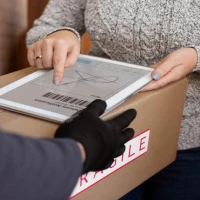
Courier & Delivery Scams
Get in touchAt Scam Claims we specialise in supporting victims and across the UK who have been targeted by fraudsters posing as couriers or delivery companies.
These scams are on the rise in the UK, driven by the growth of online shopping and the dependence on parcel services.
Victims are often tricked through fake text messages, emails, or phone calls claiming that a parcel is awaiting redelivery or collection.
In more serious cases, courier scams involve fraudsters arriving in person, pretending to be legitimate couriers, and collecting cash, bank cards, or valuable goods under false pretences. Victims frequently face both financial losses and significant stress when they realise they have been deceived.
Why Have Courier and Delivery Scams Become a Growing Problem?
Courier scams have become increasingly common because the victims receive convincing communications claiming that a parcel cannot be delivered until a small fee is paid. These messages direct them to fraudulent websites designed to steal bank details.
Delivery scams extend this deception further, with fraudsters physically arriving at victims’ homes to collect cards, goods, or payments by pretending to represent a courier firm. These scams thrive on urgency and convenience, pressuring victims to comply before questioning the authenticity of the request.
How Much Do Victims Typically Lose to Courier and Delivery Scams in or Around ?
Losses from courier scams across the UK, delivery scam victims lose between £500 and £1,200, though identity fraud and account takeovers have led to much higher figures in certain cases.
Some victims lose only a few pounds in fake redelivery fees, but when fraudsters gain access to personal information or bank accounts, losses can quickly escalate into hundreds or even thousands of pounds.
Which Types of Courier and Delivery Scams Are Most Common Across ?
Courier and delivery scam solicitors regularly deal with a range of fraudulent schemes, including:
Phishing texts and emails – Messages claiming a parcel is being held until a small fee is paid, directing victims to fake websites that steal banking details.
Courier fraud in person – Fraudsters arriving at homes posing as couriers to collect bank cards, cash, or valuable goods under false pretences.
Parcel reshipping scams – Victims tricked into acting as intermediaries, unknowingly handling and forwarding stolen goods.
Fake delivery notes – Fraudulent cards left at properties instructing residents to call premium-rate phone numbers, leading to further financial loss.
Can Victims Recover Money Lost to Courier and Delivery Fraud?
Victims may be able to recover some or all of the money lost to courier and delivery scams under UK consumer and banking law. Payments made by credit card may be reclaimed under Section 75 of the Consumer Credit Act, while debit card payments may be eligible for chargeback.
Victims who transferred money directly may also be able to claim under Authorised Push Payment (APP) fraud protections. Legal guidance is often essential, as solicitors can challenge banks that initially reject claims, escalate cases to the Financial Ombudsman Service, and pursue civil recovery if required.
Contact Scam Claims to discuss your options for financial recovery.
How Do Lawyers Work With Banks and Authorities to Recover Funds?
Courier scam solicitors work closely with banks to freeze suspicious accounts, trace stolen money, and request recalls under APP fraud rules. They also liaise with online platforms and payment providers to investigate fraudulent transactions and provide supporting evidence for claims.
In cases where fraudsters have physically collected items or cards, solicitors may involve law enforcement and trading standards to track stolen goods and strengthen claims. When fraud involves international transfers, solicitors work with overseas regulators and financial institutions to improve the chances of recovery.
Are No Win, No Fee Options Available for Courier Scam Claims?
Our courier and delivery scam solicitors offer no-win, no-fee arrangements, ensuring victims can pursue claims without the pressure of upfront solicitors’ fees.
Costs are only payable if the case is successful, typically as a percentage of the recovered compensation. This funding model makes legal support more accessible and provides reassurance to victims already struggling with financial loss.
What’s the Process for Bringing a Courier or Delivery Scam Claim Forward in or Around ?
The process of making a courier scam claim begins with an initial consultation. A solicitor reviews payment records, fraudulent emails, texts, or delivery notes, and assesses the evidence. From there, the solicitor prepares and submits claims to the relevant bank or payment provider.
If an initial claim is unsuccessful, the case may be escalated to the Financial Ombudsman Service or pursued through the civil courts. Victims receive regular updates, professional guidance, and practical support throughout the process.
What Legal Support Do Fraud Solicitors Provide for Courier Scam Cases?
Courier and delivery scam solicitors provide a full range of services to assist victims, including:
Case assessment – Reviewing the strength of a claim and available recovery options.
Evidence gathering – Collecting fraudulent communications, payment records, and delivery documents.
Claims against banks – Pursuing reimbursement under Section 75 and APP fraud rules.
Regulatory complaints – Escalating disputes to the Financial Ombudsman Service where necessary.
Civil litigation – Taking legal action against fraudsters or negligent third parties.
Reporting support – Assisting with reports to Action Fraud, trading standards, and law enforcement.
Do Courier Scam Solicitors Handle Both Domestic and International Fraud Cases?
Courier scam solicitors handle both domestic and international cases. UK-based scams often involve fake messages using the names of well-known courier firms, while international scams may involve fraudulent parcel releases or payments routed overseas.
Although cross-border recovery can be complex, solicitors use their knowledge of UK banking systems and international regulatory frameworks to pursue funds wherever possible.
Contact Scam Claims today to find out how we can support your case.
Get in touch
Skip to
Gallery



